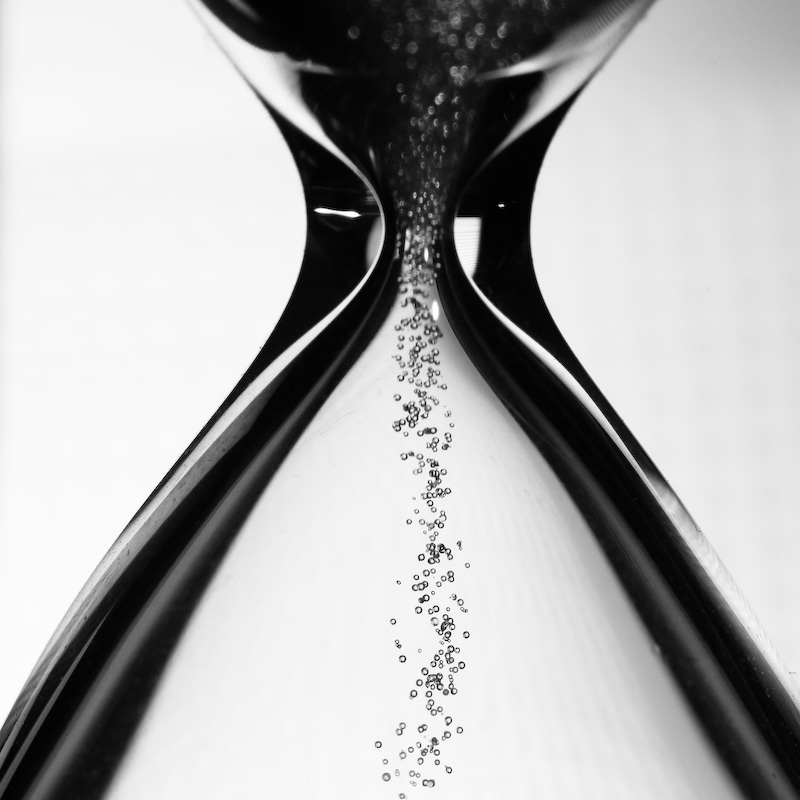14 Seconds
Toni sits across the exam room edgy and slumped, drying tears tracking through her mascara and makeup like little snowplows. She is 47 and doesn't understand how her life could possibly have been demolished. On top of her game, she went from an active and social, fun loving, well-dressed, accomplished consultant to a fragile, sleepless, friendless, jobless, hopeless wreck in 3 years since a relatively minor car accident. She blames it all on her pain.
In the brief pause we find ourselves silently looking at each other, a gulf widens threatening to swallow us both if we aren't careful here.
In Search of Lost Time by Alexander Boden via CC BY-SA 2.0
Unbidden, I immediately feel sympathy, pity. I'm not supposed to. I'm supposed to empathize, not sympathize, but I can't help it. It's human. Her story sucks and I feel sorry it has happened. In the next second, I silently conjure empathy, imagining how I would feel in her shoes. It is not pretty and realize a fury I have not known for awhile is what would arise. A fury I am sure she has also known, but has long since burned out, vanquished, as the weight of her world blackholes in on her. I see she is stuck, feeling cornered with no way out. I have trouble imagining this stuckness, even if I understand it, because "stuckness" is not something I can remember feeling for very long. There was always a sliver of light somewhere to follow. Then I realize, it is not stuckness she feels, but hopelessness — more severe, intractable stuckness that I have never felt. I try to feel it, or imagine I do. I can't. Lucky me. Sympathy returns when unable to empathsize. Fear comes next as I feel helpless in the face of her hopelessness. Wait, maybe I do empathize — is helpless the same as hopeless? What do I do with this? Now fear turns to panic as my "Doctor DNA", pounded into me by years of training, kicks in. "Do something!" it screams. "Say something! She is here for your help you idiot, do you have nothing!? You're a doctor for Christ's sake! A specialist!"
"That's not helping," I say. Next comes doubt. Can it really be this bad? How is it possible she can't pull it together? It was a fairly minor car accident. Then suspicion: is there something else going on? (I imagine my eyebrow rising Colombo style and hope that it really isn't.) Are these prisons she feels stuck in real or illusory? Brief rapid thoughts, protective against my helplessness. Victim blaming in essence. It doesn't matter the origins of her prisons. She is in them; they are real. My mind arguing against itself now. But is it just the pain? Of course she has pain. I believe it implicitly and understand how her neurobiology can make it happen. But there are other layers. She wants the fix I imagine. Of course she does. I would too. But I see all the layers in their messiness. The fear. The husband. The litigation. The injustice. The drinking. I know I don't have the fix. Not here. Not today.
Sympathy, empathy, helplessness, fear, doubt, suspicion, belief
These cognitive gymnastics, in this silent gulf, are not helping. Let's move on shall we? A lot has been tried, and she is still in pain. Look for the sliver of light, maybe we'll find a way out. The Doctor DNA wants a clear confident answer, to not appear weak, vulnerable or vague. No bullshit. It might even tell a story (or bullshit?) to save face. The human DNA is unflapped by all of this and says, "Start by passing her a tissue." Human DNA wins.
All this occurs in 14 seconds. I don't know what thoughts she had as she stared at me composing herself behind drying tears. I pick up the box of tissues and hand her one. For the briefest of moments we squeeze hands with a crumpled Kleenex in the mix. "Let's see what we can do," is all I can offer, hoping my weakness is not overly obvious and attached tenuously to that sliver of light. She seems to feel better, giving me some courage to also go on.
I have failings as a human being and a doctor. Thankfully, Google hasn't found a way to record and publish them. A team helps reduce them. Often it is a team of two — patient and provider.
Do we ever examine our thoughts and weaknesses when faced with the pain and suffering of others?
Toni, like all "patients" mentioned in this blog is fictional, conjured from an amalgamation of reality and imagination.

